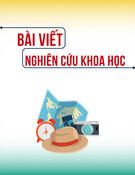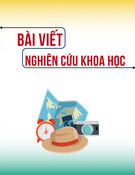
Cao Thi Cam Huong / Tạp chí Khoa học và Công nghệ Đại học Duy Tân 02(69) (2025) 157-167
157
D U Y T A N U N I V E R S I T Y
Decoding tourist behavior on online travel agencies:
Insights from Da Nang city
Giải mã hành vi du khách trên các đại lý du lịch trực tuyến:
Nghiên cứu tại thành phố Đà Nẵng
Cao Thi Cam Huonga*
Cao Thị Cẩm Hươnga*
aFaculty of International Tourism & Event Management (ITEM), Hospitality and Tourism Institute, Duy Tan
University, Da Nang, 550000, Vietnam
aKhoa Lữ hành & Sự kiện Quốc tế, Trường Du lịch, Ðại học Duy Tân, Ðà Nẵng, Việt Nam
(Date of receiving article: 07/01/2024, date of completion of review: 05/02/2025, date of acceptance for posting:
18/03/2025)
Abstract
The rapid growth of online booking platforms has significantly impacted the tourism industry, particularly in
destinations that rely on tourism and are promoting digital transformation in hospitality, such as Da Nang, Vietnam.
Understanding tourists' consumer behavior in this digital landscape is crucial for optimizing marketing strategies and
enhancing customer satisfaction. This study aims to investigate the factors influencing tourists' intentions to book
accommodations online in Da Nang City, focusing on the roles of quality of benefit value, monetary value, social status
value, preference value, and information value. A mixed-method approach was employed, combining qualitative
interviews with quantitative surveys. Qualitative data were gathered through interviews with industry experts and tourists,
while a structured questionnaire was distributed to a sample of 400 tourists who have experience with online hotel
bookings. This study employed analytical techniques, including confirmatory factor analysis (CFA) to assess the
reliability and validity of the measurement scales, followed by structural equation modeling (SEM) to evaluate the
structural path of the proposed conceptual model using SMARTPLS 4, ensuring robust findings. The findings reveal that
tourists' intentions to book accommodations online (Purchase Intention - PI) is positively influenced by quality of benefit
value (QBV), monetary value (MV), preference value (PV), and information value (IV). Conversely, social status value
(SSV) negatively affects purchase intentions, indicating that higher social status perception may lead to reluctance in
online bookings. The study highlights the importance of understanding consumer behavior on online hotel bookings.
Marketers should emphasize the information value and preference value while addressing the complexities surrounding
social status perception to enhance booking intentions among tourists in Da Nang City. These insights can inform strategic
marketing initiatives aimed at improving the online booking experience.
Keywords: Online hotel booking channels; tourists' consumer behavior; Da Nang, Viet Nam.
Tóm tắt
Sự phát triển nhanh chóng của các nền tảng đặt phòng trực tuyến đã ảnh hưởng đáng kể đến ngành du lịch, đặc biệt
tại các địa phương phụ thuộc vào du lịch và đẩy mạnh chuyển đổi số trong lưu trú như Đà Nẵng, Việt Nam. Việc hiểu rõ
hành vi tiêu dùng của du khách trong bối cảnh kỹ thuật số này rất quan trọng để tối ưu hóa chiến lược tiếp thị và nâng cao
*Corresponding author: Cao Thi Cam Huong
Email: caotcamhuong@dtu-hti.edu.vn
02(69) (2025) 157-167
DTU Journal of Science and Technology

Cao Thi Cam Huong / Tạp chí Khoa học và Công nghệ Đại học Duy Tân 02(69) (2025) 157-167
158
sự hài lòng của khách hàng. Nghiên cứu này nhằm mục tiêu khám phá các yếu tố ảnh hưởng đến ý định đặt phòng trực
tuyến của du khách tại thành phố Đà Nẵng, tập trung vào vai trò của giá trị lợi ích, giá trị tiền tệ, giá trị địa vị xã hội, giá
trị ưu tiên và giá trị thông tin. Một phương pháp kết hợp đã được áp dụng, kết hợp giữa phỏng vấn định tính và khảo sát
định lượng. Dữ liệu định tính được thu thập thông qua phỏng vấn các chuyên gia trong ngành và du khách, thông qua
bảng câu hỏi đã được phân phát cho mẫu 400 du khách có kinh nghiệm với việc đặt phòng khách sạn trực tuyến. Nghiên
cứu này đã sử dụng các kỹ thuật phân tích, bao gồm phân tích nhân tố khẳng định (CFA) để đánh giá độ tin cậy và tính
hợp lệ của các thang đo, và mô hình phương trình cấu trúc (SEM) để đánh giá đường dẫn cấu trúc của mô hình khái niệm
đề xuất bằng SMARTPLS 4, nhằm đảm bảo kết quả chắc chắn.
Kết quả nghiên cứu cho thấy ý định đặt phòng trực tuyến của du khách (Purchase Intention - PI) chịu ảnh hưởng tích
cực bởi giá trị lợi ích (QBV), giá trị tiền tệ (MV), giá trị ưu tiên (PV), và giá trị thông tin (IV). Ngược lại, giá trị địa vị xã
hội (SSV) có ảnh hưởng tiêu cực đến ý định mua hàng, chỉ ra rằng nhận thức về địa vị xã hội cao có thể dẫn đến sự do dự
trong việc đặt phòng trực tuyến. Nghiên cứu này nhấn mạnh tầm quan trọng của việc hiểu hành vi tiêu dùng trong đặt
phòng khách sạn trực tuyến. Các nhà tiếp thị nên nhấn mạnh vào giá trị thông tin và giá trị ưu tiên đồng thời giải quyết
các phức tạp xung quanh nhận thức về địa vị xã hội để tăng cường ý định đặt phòng của du khách tại thành phố Đà Nẵng.
Những hiểu biết này có thể hỗ trợ các ý tưởng tiếp thị chiến lược nhằm cải thiện trải nghiệm đặt phòng trực tuyến.
Từ khóa: Kênh đặt phòng khách sạn trực tuyến; Hành vi tiêu dùng của du khách; Đà Nẵng, Việt Nam.
1. Introduction
The Vietnamese tourism industry has
witnessed significant growth in recent years,
with Da Nang emerging as a popular travel
destination. The advancement of information
technology has led to the increasing prevalence
of online travel agency (OTA) channels,
providing travelers with greater convenience
and a wider array of options for booking
accommodations. Understanding consumer
behavior in OTA channels is crucial for hotel
businesses and policymakers to develop
effective strategies to attract tourists and
promote the growth of the tourism sector.
Research on tourists' consumer behavior
within OTA channels has gained attention from
scholars in recent years. Several studies have
focused on the factors influencing tourists'
online booking decisions, such as pricing,
location, amenities, and customer reviews
[11][20]. Other studies have examined the
impact of OTA channels on tourists' behavior,
including satisfaction levels, loyalty, and revisit
intention [3][20].
Currently, there is a limited number of in-
depth studies on tourists' consumer behavior in
OTA channels at specific destinations like Da
Nang. This research aims to fill this gap by
investigating consumer behavior in OTA
channels in Da Nang city. The study will employ
both quantitative and qualitative methods to
collect data from international and domestic
travelers. Quantitative data will be gathered
through online surveys, while qualitative data
will be collected through in-depth interviews.
Data analysis will be conducted using
appropriate statistical methods.
This research is expected to provide valuable
insights into tourists' consumer behavior in OTA
channels in Da Nang. These insights could be
utilized by hospitality and tourism businesses
and policymakers to develop effective strategies
to attract tourists and promote the growth of the
tourism industry.
2. Literature review
An Online Travel Agency (OTA) is an online
business platform that provides consumers with
booking services for hotels, flights, tours, and
other related services through the internet. OTAs
typically offer convenience and a wide range of
options for customers, allowing them to easily
compare and book travel services quickly and
efficiently.
Research on the factors influencing tourists'
intention to choose OTAs has received significant
attention in consumer behavior studies. According
to Tan et al. (2014) [27], factors such as website
trustworthiness, service quality, convenience, and

Cao Thi Cam Huong / Tạp chí Khoa học và Công nghệ Đại học Duy Tân 02(69) (2025) 157-167
159
the features of the OTA platform have a
considerable impact on customers' choices. Hua
and Saxena (2015) [10] also found that
competitive pricing and promotional programs
offered by OTAs are important factors in
customers' purchasing decisions.
Conrady and Buck (2011) [5] emphasized
that "the ability to create trust in the website" is
one of the key factors for customers to trust and
choose OTAs for booking travel services. This
highlights the importance of security and
professionalism of OTA platforms in building a
trustworthy relationship with customers.
The consumption values perspective offers a
robust framework for understanding consumer
behavior, particularly within the context of
Online Travel Agencies (OTAs). Rooted in the
Theory of Consumption Values (TCV), this
perspective conceptualizes consumer-perceived
value through five dimensions: functional,
social, emotional, epistemic, and conditional
value [25][2]. These dimensions are structurally
interrelated, influencing consumer decision-
making processes and behavior. Importantly,
this framework emphasizes that consumption
values are shaped by self-image and self-
evaluation, suggesting that consumers assess the
worth of products or services not only based on
functional attributes but also on how these align
with their self-perception and social context.
When applied to the study of OTA purchase
intentions, the consumption values perspective
provides a comprehensive approach for analyzing
various factors that influence tourists' decisions.
Specifically, five key components are used to
measure OTA purchase intentions: Quality-of-
Benefits Value (QBV), Monetary Value (MV),
Social Status Value (SSV), Preference Value
(PV), and Information Value (IV).
Quality-of-Benefits Value (QBV) reflects the
perceived usefulness and advantages of OTAs,
including service quality and convenience, which
strongly impact consumer preferences [14].
Monetary Value (MV) pertains to the
perceived financial benefits, such as competitive
pricing and promotional offers, which drive
tourists toward OTA platforms [4][17].
Social Status Value (SSV) highlights the role
of OTAs in reinforcing a consumer's social
standing, influencing decisions through
perceived prestige or alignment with their social
identity [9,19,22,23,31].
Preference Value (PV) emphasizes individual
preferences shaped by past experiences,
personal biases, and specific needs, guiding
choices based on perceived satisfaction
[15,16,23,24].
Information Value (IV) addresses the ease of
accessing and utilizing information on OTA
platforms, where clear, accurate, and reliable
data can significantly boost consumer trust and
decision-making [1,21,23].
This multidimensional approach not only
accounts for the tangible benefits of using OTAs
but also incorporates intangible, psychological
factors that affect perceived value and purchase
intentions. By analyzing consumer behavior
through these interrelated values, researchers
can gain a more nuanced understanding of why
tourists choose specific OTAs and how these
choices are influenced by broader personal,
social, and contextual factors. Ultimately, the
consumption values perspective enriches the
study of OTA purchase behavior, offering a
more holistic and psychologically informed
view of consumer decision-making.
The use of the consumption value perspective
in studying tourist consumer behavior when
choosing Online Travel Agencies (OTAs) offers
numerous advantages compared to traditional
approaches. It is broader, encompassing both
tangible and intangible factors, such as
emotional value, social value, conditional value,
and curiosity value. By adopting the
consumption value perspective, consumer

Cao Thi Cam Huong / Tạp chí Khoa học và Công nghệ Đại học Duy Tân 02(69) (2025) 157-167
160
behavior research moves beyond merely
measuring functional efficiency to explore the
intangible factors that influence tourists'
decisions. It offered more comprehensive
approaches that fully reflect the diverse
motivations behind consumers' choices.
3. Methodology
3.1. Data collection
3.1.1. Interview question themes
The primary objective of this study is to
investigate tourists' consumer behavior when
using online hotel booking channels in Da Nang
City. The development of the interview
questionnaire was based on the conceptual
framework of the research model. To ensure
relevance and comprehensiveness, we
constructed the questionnaire by considering
key variables related to consumer behavior,
including booking preferences, decision-making
factors, and perceived value of online booking
channels. In building the questionnaire, we
consulted with five tourism experts. These
experts included two lecturers specializing in
hotel management, two managers from tourism
companies, and one hotel accommodation
manager. Their input was essential in shaping
the questionnaire to reflect the practical and
theoretical aspects of the tourism industry. After
constructing the initial questionnaire, we
conducted a pre-test with 50 tourists to evaluate
the clarity and suitability of the questions. The
pre-test ensured that respondents fully
understood the survey items and the
measurement scales used. All participants
reported that the questions were clear and easy
to comprehend, confirming the questionnaire’s
appropriateness for the study.
3.1.2. Interview data collection
The formal data collection for this study took
place between June 1, 2024, and July 30, 2024, in
Da Nang City. Tourists were approached in key
tourism areas and invited to participate in the
survey by scanning a QR code that directed them
to an online questionnaire hosted on Google
Form. This approach enabled quick and efficient
data collection, with more than 200 valid
responses recorded. Face-to-face interactions
ensured clarity, allowing participants to ask
questions or request clarifications as needed,
while the digital format allowed for precise time-
stamping of responses, adding accuracy to the
data collection process. A convenience sampling
method was employed, targeting tourists present
in high-traffic areas of Da Nang, including major
beaches, cultural attractions, and popular
shopping areas. The aim was to capture a broad
spectrum of tourists engaged in leisure activities,
ensuring diversity in terms of demographics,
travel motivations, and booking behaviors. This
method provided real-time access to tourists
actively involved in hotel booking decisions,
which is relevant to the study's focus on consumer
behavior on online hotel booking channels. The
interview process was semi-structured, with a
combination of face-to-face interactions and
digital self-reporting. After a brief introduction
explaining the purpose of the study, tourists were
asked to scan a QR code using their smartphones
to access the survey. The questionnaire was
designed to take no more than 10-15 minutes,
covering key topics related to online hotel
booking behaviors, decision-making criteria, and
satisfaction levels with current booking
platforms. Respondents could complete the
survey at their own pace, with researchers
available nearby to assist if needed. Ethical
guidelines were strictly followed throughout the
data collection process. Before participation,
tourists were informed of the study’s purpose,
assured that their responses would remain
anonymous, and provided with the option to
decline participation without consequence. No
personal identifying information was collected,
and participants were given the opportunity to

Cao Thi Cam Huong / Tạp chí Khoa học và Công nghệ Đại học Duy Tân 02(69) (2025) 157-167
161
exit the survey at any time. Informed consent was
obtained digitally before starting the
questionnaire, in line with ethical standards for
research involving human subjects.
All data was recorded directly through
Google Form, ensuring that responses were
securely stored and accessible for analysis. The
use of QR codes allowed for real-time entry of
responses, minimizing the risk of data loss or
manual input errors. Each submission was
automatically time-stamped, providing an
accurate log of when responses were received.
After the survey period concluded, the data was
exported for analysis, ensuring that only
authorized personnel could access the dataset.
Several challenges were encountered during
data collection, including fluctuating tourist
traffic in certain areas due to weather conditions
and local events. To adapt, the research team
extended data collection hours in busy periods
and relocated to alternative high-traffic areas
when needed. Additionally, some tourists were
unfamiliar with scanning QR codes, requiring
brief explanations from the researchers. Despite
these challenges, the combination of in-person
engagement and digital data collection ensured
that the target number of valid responses was
met efficiently.
Figure 1. Proposed research model
3.2. Data analysis techniques
In this study, a comprehensive approach was
employed to analyze the data collected from
tourists and industry experts. The primary tools
and techniques used for data analysis include:
Analytical Tools: To assess the reliability and
validity of the measurement scales, confirmatory
factor analysis (CFA) was conducted. CFA is
essential for verifying the factor structure of the
questionnaire items and ensuring that the
constructs are accurately measured [2].
Following CFA, structural equation modeling
(SEM) was applied using SMARTPLS 4. SEM
helps evaluate the structural paths in the
proposed conceptual model and understand the
relationships between variables [13].
Reliability and Validity Testing: The study
utilized CFA to assess the reliability and validity
Purchase intention
(PI)
Quality-of-benefit value
(QBV)
Monetary value (MV)
Social Status value
(SSV)
Preference value
(PV)
Information value
(IV)

![Đề cương ôn tập Bản đồ du lịch [năm hiện tại]](https://cdn.tailieu.vn/images/document/thumbnail/2025/20250809/dlam2820@gmail.com/135x160/53061754884441.jpg)









![Giáo trình Quản trị kinh doanh điểm đến du lịch [chuẩn nhất]](https://cdn.tailieu.vn/images/document/thumbnail/2026/20260122/lionelmessi01/135x160/19071769095813.jpg)


![Đề cương cuối kì môn Văn hóa du lịch [năm] chuẩn nhất](https://cdn.tailieu.vn/images/document/thumbnail/2025/20251230/phuongnguyen2005/135x160/26091768806381.jpg)
![Tài liệu ôn tập Quản trị du lịch [mới nhất]](https://cdn.tailieu.vn/images/document/thumbnail/2025/20251230/phuongnguyen2005/135x160/54881768806384.jpg)
![Câu hỏi ôn tập nghiệp vụ hướng dẫn viên du lịch quốc tế [mới nhất]](https://cdn.tailieu.vn/images/document/thumbnail/2025/20251230/phuongnguyen2005/135x160/31071768808252.jpg)









